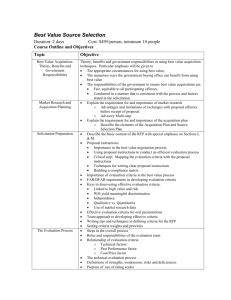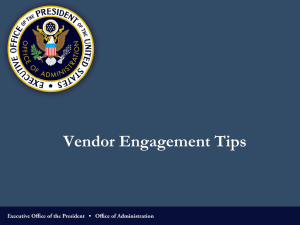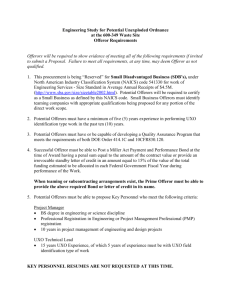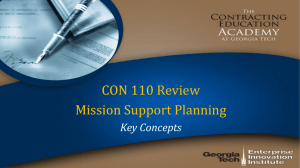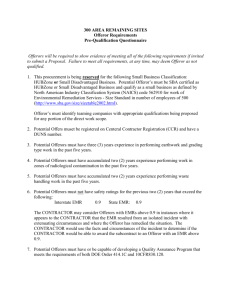FAR * Part 15 Contracting by Negotiation
advertisement
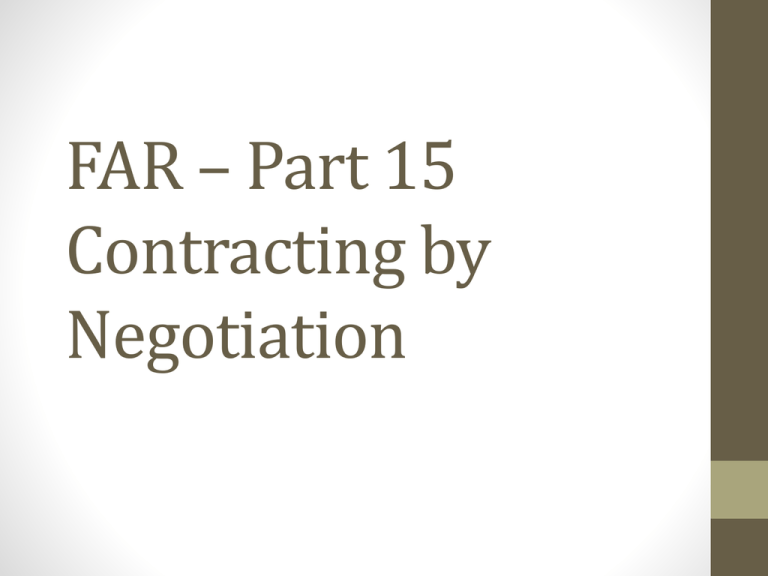
FAR – Part 15 Contracting by Negotiation 15.000 – Scope of Part • Policies and procedures governing competitive and noncompetitive negotiated acquisitions. • A contract awarded using other than sealed bidding procedures is a negotiated contract (see 14.101). 15.001 – Definitions • “Deficiency” is a material failure of a proposal to meet a Government requirement or a combination of significant weaknesses in a proposal that increases the risk of unsuccessful contract performance to an unacceptable level. • “Proposal modification” is a change made to a proposal before the solicitation closing date and time, or made in response to an amendment, or made to correct a mistake at any time before award. • “Proposal revision” is a change to a proposal made after the solicitation closing date, at the request of or as allowed by a contracting officer, as the result of negotiations. • “Weakness” means a flaw in the proposal that increases the risk of unsuccessful contract performance. A “significant weakness” in the proposal is a flaw that appreciably increases the risk of unsuccessful contract performance. 15.002 – Types of Negotiated Acquisition • Sole source acquisitions. RFP should be tailored to remove unnecessary information and requirements; e.g., evaluation criteria and voluminous proposal preparation instructions. • Competitive acquisitions. The procedures of this part are intended to minimize the complexity of the solicitation, the evaluation, and the source selection decision, while maintaining a process designed to foster an impartial and comprehensive evaluation of offerors’ proposals, leading to selection of the proposal representing the best value to the Government (see 2.101). Subpart 15.1 – Source Selection Processes and Techniques • Describes some of the acquisition processes and techniques that may be used to design competitive acquisition strategies suitable for the specific circumstances of the acquisition. • Best Value Continuum • Tradeoff Process • Lowest price technically acceptable • Oral Presentations 15.101 – Best Value Continuum High High Low High Importance of Cost or Price Performance Risk Clarity of Requirement • An agency can obtain best value in negotiated acquisitions by using any one or a combination of source selection approaches. Low High Importance of Cost or Price • Tradeoff process: appropriate when it may be in the best interest of the Government to consider award to other than the lowest priced offeror or other than the highest technically rated offeror. • Lowest price technically acceptable source selection: appropriate when best value is expected to result from selection of the technically acceptable proposal with the lowest evaluated price. • • Solicitation shall specify award will be made on the basis of the lowest evaluated price of proposals meeting or exceeding the acceptability standards for non-cost factors. Tradeoffs are not permitted; not ranked using non-cost/price factors; exchanges may occur 15.102 – Oral Presentations • Oral presentations may substitute for, or augment, written information. • Can be effective in streamlining the source selection process • May occur at any time in the acquisition process, and are subject to the same restrictions as written information, regarding timing and content. • Provide an opportunity for dialogue among the parties. • Pre-recorded videotaped presentations that lack real-time interactive dialogue are not considered oral presentations for the purposes of this section, although they may be included in offeror submissions, when appropriate. • Representations and certifications shall be submitted as required in the FAR provisions at 52.204-8(d) or 52.212-3(b), and a signed offer sheet (including any exceptions to the Government’s terms and conditions) shall be submitted in writing. 15.102 – Oral Presentations. • Information pertaining to areas such as an offeror’s capability, past performance, work plans or approaches, staffing resources, transition plans, or sample tasks (or other types of tests) may be suitable • In deciding what information to obtain through an oral presentation, consider the following: 1. 2. 3. 4. The Government’s ability to adequately evaluate the information The need to incorporate any information into the resultant contract; The impact on the efficiency of the acquisition; and The impact (including cost) on small businesses. COs should also consider alternatives to on-site oral presentations (e.g., teleconferencing, video teleconferencing). 15.102 – Oral Presentations • When oral presentations are required, the solicitation may describe -1. The types of information and the associated evaluation factors that will be used 2. The qualifications for personnel 3. The requirements for, and any limitations and/or prohibitions on, the use of written material or other media 4. The location, date, and time 5. The restrictions governing the time permitted and 6. The scope and content of exchanges that may occur between the Government’s participants and the offeror’s representatives as part of the oral presentations, including whether or not discussions will be permitted during oral presentations. Subpart 15.2 -- Solicitation and Receipt of Proposals and Information • Policies and procedures for a) Exchanging information with industry prior to receipt of proposals; b) Preparing and issuing RFPs and RFIs; and c) Receiving proposals and information. 15.201 -- Exchanges With Industry Before Receipt of Proposals • Exchanges of information among all interested parties (potential offerors, end users, Government acquisition and supporting personnel, and others involved in the conduct or outcome) from the earliest identification of a requirement through receipt of proposals, are encouraged. The purpose of exchanging information is to: • improve the understanding of Government requirements and industry capabilities; • enhance the Government’s ability to obtain quality supplies and services, including construction, at reasonable prices; • and increase efficiency in proposal preparation, proposal evaluation, negotiation, and contract award. • An early exchange of information among industry and the program manager, CO, and other participants in the acquisition process can identify and resolve concerns including: • proposed contract type, terms and conditions, and acquisition planning schedules • the feasibility of the requirement, including performance requirements, statements of work, and data requirements • the suitability of the proposal instructions and evaluation criteria, including the approach for assessing past performance information • the availability of reference documents • any other industry concerns or questions 15.201 -- Exchanges With Industry Before Receipt of Proposals • Some techniques to promote early exchanges of information are – 1. 2. 3. 4. 5. 6. 7. 8. 9. Industry or small business conferences Public hearings Market research, as described in part 10 One-on-one meetings with potential offerors (any that are substantially involved with potential contract terms and conditions should include the CO) Presolicitation notices Draft RFPs RFIs Presolicitation or preproposal conferences Site visits • Electronic notices, may be used to publicize the Government’s requirement or solicit information from industry. 15.201 -- Exchanges With Industry Before Receipt of Proposals • RFIs may be used when the Government does not presently intend to award a contract, but wants to obtain price, delivery, other market information, or capabilities for planning purposes. • No required format for RFIs. • General information about agency mission needs and future requirements may be disclosed at any time. • After release of the solicitation, the CO must be the focal point of any exchange with potential offerors. • When specific information about a proposed acquisition that would be necessary for the preparation of proposals is disclosed to one or more potential offerors, that information must be made available to the public as soon as practicable, but no later than the next general release of information. Information provided to a potential offeror must not be disclosed if doing so would reveal the potential offeror’s confidential business strategy. When conducting a presolicitation or preproposal conference, materials distributed at the conference should be made available to all potential offerors, upon request. 15.202 -- Advisory Multi-Step Process. • A presolicitation notice provides a general description of the scope or purpose of the acquisition and invites potential offerors to submit information that allows the Government to advise the offerors about their potential to be viable competitors. • should identify the information that must be submitted and criteria evaluated • Info sought may be limited to a statement of qualifications and other information (e.g., proposed technical concept, past performance, and limited pricing information). • Shall contain sufficient information to permit a potential offeror to make an informed decision about whether to participate in the acquisition. • Should not be used for multi-step acquisitions where it would result in offerors being required to submit identical information in response to the notice and in response to the initial step of the acquisition. • The agency shall evaluate all responses in accordance with the criteria stated in the notice, and shall advise each respondent in writing either that it will be invited to participate in the resultant acquisition or that it is unlikely to be a viable competitor. • The agency shall advise respondents considered not to be viable competitors of the general basis for that opinion and shall inform all respondents that, notwithstanding the advice provided by the Government in response to their submissions, they may participate in the resultant acquisition. 15.203 -- Requests for Proposals. • Requests for proposals (RFPs) are used to communicate Government requirements to prospective contractors and to solicit proposals. At a minimum, shall describe the -1) 2) 3) 4) Government’s requirement Anticipated terms and conditions that will apply to the contract (including CLIN structure) Information required to be in the offeror’s proposal Factors and significant subfactors that will be used to evaluate the proposal and their relative importance. • An RFP may be issued for OMB Circular A-76 studies. See subpart 7.3 for additional information regarding cost comparisons between Government and contractor performance. • Electronic commerce may be used. In this case, the RFP shall specify the electronic commerce method(s) that offerors may use (see subpart 4.5) 15.203 -- Requests for Proposals. • COs may issue RFPs and/or authorize receipt of proposals, modifications, or revisions by facsimile. Consideration factors: i. ii. iii. iv. Anticipated proposal size and volume; Urgency of the requirement; Availability and suitability of electronic commerce methods; and Adequacy of administrative procedures and controls for receiving, identifying, recording, and safeguarding facsimile proposals, and ensuring their timely delivery to the designated proposal delivery location. • If facsimile proposals are authorized, COs may request offeror(s) to provide the complete, original signed proposal at a later date. 15.203 -- Requests for Proposals. • Letter RFPs may be used in sole source acquisitions and other appropriate circumstances. Include at a minimum: • RFP number and date • Name, address (including electronic address and facsimile address, if appropriate), and telephone number of the contracting officer • Type of contract contemplated • Quantity, description, and required delivery dates for the item • Applicable certifications and representations • Anticipated contract terms and conditions • Instructions to offerors and evaluation criteria for other than sole source actions • Proposal due date and time • Other relevant information; e.g., incentives, variations in delivery schedule, cost proposal support, and data requirements. 15.203 -- Requests for Proposals. • Oral RFPs are authorized when processing a written solicitation would delay the acquisition of supplies or services to the detriment of the Government and a notice is not required under 5.202 1. 2. The contract files supporting oral solicitations should include -I. A description of the requirement; II. Rationale for use of an oral solicitation; III. Sources solicited, including the date, time, name of individuals contacted, and prices offered; and IV. The solicitation number provided to the prospective offerors. The information furnished to potential offerors under oral solicitations should include appropriate items from letter RFPs 15.204 -- Contract Format. • The use of a uniform contract format facilitates preparation, reference, and use of the solicitation and contract by offerors, contractors, and contract administrators. Need not be used for the following: a) Construction and architect-engineer contracts (see part 36). b) Subsistence contracts. c) Supplies or services contracts requiring special contract formats prescribed elsewhere in this part that are inconsistent with the uniform format. d) Letter requests for proposals (see 15.203(e)). e) Contracts exempted by the agency head or designee. 15.204-1 -- Uniform Contract Format. SECTION TITLE Part I—The Schedule A Solicitation/contract form B Supplies or services and prices/costs C Description/specifications/statement of work D Packaging and marking E Inspection and acceptance F Deliveries or performance G Contract administration data H Special contract requirements Part II—Contract Clauses I Contract clauses Part III—List of Documents, Exhibits, and Other Attachments J List of attachments Part IV—Representations and Instructions*** K Representations, certifications, and other statements of offerors or respondents L Instructions, conditions, and notices to offerors or respondents M Evaluation factors for award 15.205 -- Issuing Solicitations. • The CO shall issue solicitations to potential sources in accordance with the policies and procedures in 5.102, 19.2024, and part 6. • A master solicitation, as described in 14.203-3, may also be used for negotiated acquisitions. 15.206 -- Amending the Solicitation • When, either before or after receipt of proposals, the Government changes its requirements or terms and conditions. • Issued before time and date of receipt of proposals = issued to all parties • Issued after time and date for receipt of proposals = issued to all offerors that have not been eliminated from the competition. • If a proposal involves a departure from the stated requirements, the CO shall amend the solicitation, provided this can be done without revealing to the other offerors the alternate solution proposed or any other information that is entitled to protection (see 15.207(b) and 15.306(e)). • The CO shall cancel the solicitation and issue a new one if, in their judgment based on market research or otherwise, an amendment proposed for issuance after offers have been received is so substantial as to exceed what prospective offerors reasonably could have anticipated, so that additional sources likely would have submitted offers had the substance of the amendment been known to them 15.206 -- Amending the Solicitation. • Oral notices may be used when time is of the essence. The CO shall document the contract file and formalize the notice with an amendment (see subpart 4.5, Electronic Commerce in Contracting). • At a minimum, the following information should be included in each amendment: • • • • • • Name and address of issuing activity. Solicitation number and date. Amendment number and date. Number of pages. Description of the change being made. Government point of contact and phone number (and electronic or facsimile address, if appropriate). • Revision to solicitation closing date, if applicable. 15.207 -- Handling Proposals and Information • Proposals and information received in response to a RFI shall be marked with the date and time of receipt and shall be transmitted to the designated officials. • Proposals shall be safeguarded from unauthorized disclosure throughout the source selection process. (See 3.104 regarding the disclosure of source selection information (41 U.S.C.423)). • If any portion of a proposal received by the CO electronically or by facsimile is unreadable, the CO immediately shall notify the offeror and permit the offeror to resubmit the unreadable portion of the proposal. 15.208 -- Submission, Modification, Revision, and Withdrawal of Proposals. • Offerors are responsible for submitting proposals, revisions, and modifications, so as to reach the Government office designated in the solicitation by the time specified. Offerors may use any transmission method authorized by the solicitation (i.e., regular mail, electronic commerce, or facsimile). If no time is specified in the solicitation, the time for receipt is 4:30 p.m., local time. 1. Any submittal received after the exact time specified for receipt of proposals is “late” and will not be considered unless 1. It is received before award is made 2. The CO determines that accepting the late proposal would not unduly delay the acquisition; and— i. If it was transmitted through an electronic commerce method, it was received at the initial point of entry to the Government infrastructure not later than 5:00 p.m. one working day prior to the date specified ii. There is acceptable evidence to establish that it was received at the Government installation designated and was under the Government’s control prior to the time specified or iii. It was the only proposal received 2. However, a late modification of an otherwise successful proposal, that makes its terms more favorable to the Government, will be considered at any time it is received and may be accepted. 15.208 -- Submission, Modification, Revision, and Withdrawal of Proposals • Acceptable evidence: • the time/date stamp of the installation on the proposal wrapper, • other documentary evidence of receipt maintained by the installation, or • oral testimony or statements of Government personnel. • If an emergency or unanticipated event interrupts normal Government processes and urgent requirements preclude amendment of the solicitation closing date, the time specified will be extended to the same time of day on the first work day on which normal Government processes resume. • Proposals may be withdrawn by written notice at any time before award. Oral proposals in response to oral solicitations may be withdrawn orally (CO must document the contract file). • One copy of withdrawn proposals should be retained in the contract file • Extra copies may be destroyed or returned to the offeror at the offerors request. • Electronically transmitted proposals that are withdrawn must be purged from primary and backup data storage systems after a copy is made for the file. • Extremely bulky proposals must only be returned at the offeror’s request and expense. 15.208 -- Submission, Modification, Revision, and Withdrawal of Proposals • The CO must promptly notify any offeror if its proposal, modification, or revision was received late, and must inform the offeror whether its proposal will be considered, unless contract award is imminent and the notice prescribed in 15.503(b) would suffice. • Late proposals and modifications that are not considered must be held unopened, unless opened for identification, until after award and then retained with other unsuccessful proposals. • If available, the following must be included in the contracting office files for when late: 1. 2. 3. The date and hour of receipt. A statement regarding whether the proposal was considered for award, with supporting rationale. The envelope, wrapper, or other evidence of date of receipt. 15.209 -- Solicitation Provisions and Contract Clauses • 52.215-1, Instructions to Offerors -- Competitive Acquisition: competitive solicitations where the Government intends to award a contract without discussions. 1. 2. Alternate I: Intend to make award after discussions with offerors within the competitive range Alternate II: If willing to accept alternate proposals • 52.215-2, Audit and Records-Negotiation in solicitations and contracts except for I. II. Acquisitions not exceeding the simplified acquisition threshold; The acquisition of utility services at rates not exceeding those established to apply uniformly to the general public, plus any applicable reasonable connection charge; or III. The acquisition of commercial items exempted under 15.403-1. • Alternate I: When using American Recovery and Reinvestment Act (ARRA)the exceptions above are not applicable. Use: • In the case of a bilateral contract modification with ARRA funding • In the case of a task- or delivery-order contract with some or all ARRA funding • Alternate II: For cost-reimbursement contracts with State and local Governments, educational institutions, and other nonprofit organizations • Alternate III: When the head of the agency has waived the examination of records by the Comptroller General 15.209 -- Solicitation Provisions and Contract Clauses • 52.215-3, Request for Information or Solicitation for Planning Purposes when issuing a solicitation for information or planning purposes. Must also clearly mark on the face of the solicitation that it is for information or planning purposes. • 52.215-5, Facsimile Proposals in solicitations if facsimile proposals are authorized (see 15.203(d)). • 52.215-6, Place of Performance in solicitations unless the place of performance is specified by the Government. • 52.215-8, Order of Precedence -- Uniform Contract Format, in solicitations and contracts using the format at 15.204. 15.210 -- Forms Not required but may be used at the discretion of the CO: • To issue RFPs and RFIs: • SF33, Solicitation, Offer, and Award • OF308, Solicitation and Offer -- Negotiated Acquisition, • To amend solicitations of negotiated contracts: • SF30, Amendment of Solicitation/Modification of Contract • OF309, Amendment of Solicitation, may be used. • With each request for proposal • OF17, Offer Label Subpart 15.3 -- Source Selection Scope: Selection of a source or sources in competitive negotiated acquisitions. Objective: Select the proposal that represents the best value. 15.303 – Responsibilities Agency heads are responsible. The CO is designated as the source selection authority (SSA). The SSA shall: 1. 2. 3. 4. 5. 6. Establish an evaluation team Approve the source selection strategy or acquisition plan Ensure consistency among solicitation requirements, notices to offerors, proposal preparation instructions, evaluation factors/subfactors, provisions/clauses, and data requirements; Ensure that proposals are evaluated based solely on the factors and subfactors contained in the solicitation Consider the recommendations of advisory boards or panels (if any); and Select the source or sources whose proposal is the best value to the Government The CO shall – 1. 2. 3. After release of a solicitation, serve as the focal point for inquiries from actual or prospective offerors; After receipt of proposals, control exchanges with offerors; and Award the contract(s). 15.304 -- Evaluation Factors and Significant Subfactors • The award decision is based on evaluation factors and significant subfactors that are tailored to the acquisition. • Factors must -1. Represent the key areas of importance and emphasis to be considered in the source selection decision; and 2. Support meaningful comparison and discrimination between and among competing proposals. 15.304 -- Evaluation Factors and Significant Subfactors • The factors are within the broad discretion of agency acquisition officials, subject to the following requirements: 1. 2. 3. 4. 5. 6. Price or cost to the Government The quality of the product or service (by consideration of non-cost factors such as past performance, compliance with solicitation requirements, technical excellence, management capability, personnel qualifications, and prior experience) Past Performance: i. Shall be evaluated for all negotiated competitive acquisitions expected to exceed the SAT unless the CO documents the reason past performance is not an appropriate evaluation factor for the acquisition ii. For solicitations involving bundling, be evaluated on the extent to which the offeror attained goals for SB participation under contracts that required subcontracting plans The extent of participation of small disadvantaged business concerns in performance of the contract shall be evaluated in unrestricted acquisitions expected to exceed $650,000 ($1.5 million for construction) subject to certain limitations For solicitations involving bundling, the CO must include proposed small business subcontracting participation in the subcontracting plan as an evaluation factor If telecommuting is not prohibited, agencies shall not unfavorably evaluate an offer that includes telecommuting unless the CO executes a written determination. 15.304 -- Evaluation Factors and Significant Subfactors • All factors that will affect contract award and their relative importance shall be stated clearly in the solicitation. The rating method need not be disclosed in the solicitation. The general approach for evaluating past performance information shall be described. • The solicitation shall also state, at a minimum, whether all evaluation factors other than cost or price, when combined, are -1. Significantly more important than cost or price; 2. Approximately equal to cost or price; or 3. Significantly less important than cost or price 15.305 – Proposal Evaluation • Proposal evaluation is an assessment of the proposal and the offeror’s ability to perform the prospective contract successfully. • An agency shall evaluate competitive proposals and then assess their relative qualities solely on the factors and subfactors specified in the solicitation. • Evaluations may be conducted using any rating method or combination of methods, including color or adjectival ratings, numerical weights, and ordinal rankings. • The relative strengths, deficiencies, significant weaknesses, and risks supporting proposal evaluation shall be documented in the contract file. 1. Cost or price evaluation. Normally, competition establishes price reasonableness. i. For FFP or fixed-price with economic price adjustment basis: comparison of the proposed prices will usually satisfy the requirement to perform a price analysis, and a cost analysis need not be performed. In limited situations, a cost analysis may be appropriate to establish reasonableness of the otherwise successful offeror’s price. ii. For cost-reimbursement basis: evaluations shall include a cost realism analysis to determine what the Government should realistically expect to pay for the proposed effort, the offeror’s understanding of the work, and the offeror’s ability to perform the contract. Cost realism analyses may also be used on fixed-price incentive contracts or, in exceptional cases, on other competitive fixed-price-type contracts. The CO shall document the cost or price evaluation. 15.305 – Proposal Evaluation 2. Past performance evaluation i. Shall consider the currency and relevance of the information, source of the information, context of the data, and general trends in contractor’s performance. ii. The solicitation shall i. Describe the approach for evaluating past performance, including evaluating offerors with no relevant performance history ii. Provide offerors an opportunity to identify past or current contracts for efforts similar to the Government requirement. iii. Authorize offerors to provide information on problems encountered and the offeror’s corrective actions. iv. The Government shall consider this information, as well as information obtained from any other sources, when evaluating the offeror past performance. The SSA shall determine the relevance of similar past performance information. iii. Should take into account past performance information regarding predecessor companies, key personnel who have relevant experience, or subcontractors that will perform major or critical aspects of the requirement iv. In the case of an offeror without a record of relevant past performance or for whom information on past performance is not available, the offeror may not be evaluated favorably or unfavorably on past performance. v. Should include the past performance of offerors in complying with subcontracting plan goals for small disadvantaged business (SDB) concerns, monetary targets for SDB participation, and notifications submitted under 19.1202-4(b). 15.305 – Proposal Evaluation 3. Technical evaluation. When tradeoffs are performed, the source selection records shall include – i. ii. An assessment of each offeror’s ability to accomplish the technical requirements; and A summary, matrix, or quantitative ranking, along with appropriate supporting narrative, of each technical proposal using the evaluation factors. 4. Cost information. Cost information may be provided to members of the technical evaluation team in accordance with agency procedures. 5. Small business subcontracting evaluation. Solicitations must be structured to give offers from small business concerns the highest rating for the evaluation factors • The SSA may reject all proposals received in response to a solicitation, if doing so is in the best interest of the Government. • For restrictions on the use of support contractor personnel in proposal evaluation, see 37.203(d). 15.306 -- Exchanges With Offerors After Receipt of Proposals. a) Clarifications and award without discussions: 1. Clarifications are limited exchanges, between the Government and offerors, that may occur when award without discussions is contemplated. 2. Offerors may be given the opportunity to clarify certain aspects of proposals or to resolve minor or clerical errors. 3. Award may be made without discussions if the solicitation states that the Government intends to evaluate proposals and make award without discussions. If the solicitation contains such a notice and the Government determines it is necessary to conduct discussions, the rationale for doing so shall be documented in the contract file. 15.306 -- Exchanges With Offerors After Receipt of Proposals. b) Communications with offerors before establishment of the competitive range: • Communications are exchanges, between the Government and offerors, after receipt of proposals, leading to establishment of the competitive range • Communications -• Shall only be held with offerors whose past performance information is the determining factor preventing them from being placed within the competitive range and with offerors whose placement in the competitive range is uncertain. • Shall address adverse past performance information to which an offeror has not had a prior opportunity to respond. • May be conducted to enhance Government understanding; allow reasonable interpretation; or facilitate the Government’s evaluation process. • Shall not be used to cure proposal deficiencies or material omissions, materially alter the technical or cost elements, and/or otherwise revise the proposal • May address– • Ambiguities or other concerns (e.g., perceived deficiencies, weaknesses, errors, omissions, or mistakes) and • Information relating to relevant past performance 15.306 -- Exchanges With Offerors After Receipt of Proposals. c) Competitive range. 1. Agencies shall establish the competitive range if discussions are to be conducted. Based on the ratings of each proposal against all evaluation criteria, the CO shall establish a competitive range comprised of all of the most highly rated proposals, unless the range is further reduced for efficiency. 2. The CO may determine that the number of most highly rated proposals exceeds the number at which an efficient competition can be conducted. Provided the solicitation notifies offerors that the competitive range can be limited for purposes of efficiency, the CO may limit the number of proposals in the competitive range to the greatest number that will permit an efficient competition among the most highly rated proposals. 3. If the CO decides that an offeror’s proposal should no longer be included in the competitive range, the proposal shall be eliminated from consideration for award. Written notice of this decision shall be provided to unsuccessful offerors in accordance with 15.503. 4. Offerors excluded or otherwise eliminated from the competitive range may request a debriefing. 15.306 -- Exchanges With Offerors After Receipt of Proposals. d) Exchanges with offerors after establishment of the competitive range. • Negotiations are exchanges that are undertaken with the intent of allowing the offeror to revise its proposal. • May include bargaining that may apply to price, schedule, technical requirements, type of contract, or other terms • In a competitive acquisition, they take place after establishment of the competitive range and are called discussion. 15.306 -- Exchanges With Offerors After Receipt of Proposals. Discussions: 1. Are tailored to each offeror’s proposal and conducted by the CO with each offeror within the competitive range. 2. Objective is to maximize the Government’s ability to obtain best value 3. At a minimum, the CO must discuss deficiencies, significant weaknesses, and adverse past performance information to which the offeror has not yet had an opportunity to respond. The CO also is encouraged to discuss other aspects that could be altered or explained to enhance materially the proposal’s potential for award. However, the CO is not required to discuss every area where the proposal could be improved. 4. In situations where the solicitation stated that evaluation credit would be given for technical solutions exceeding any mandatory minimums, the Government may negotiate with offerors for increased performance beyond any mandatory minimums, and the Government may suggest (in ways that are not integral to the design), that their proposals would be more competitive if the excesses were removed and the offered price decreased. 5. If, after discussions have begun, an offeror originally in the competitive range is no longer considered to be among the most highly rated offerors being considered for award, that offeror may be eliminated from the competitive range whether or not all material aspects of the proposal have been discussed, or whether or not the offeror has been afforded an opportunity to submit a proposal revision. 15.306 -- Exchanges With Offerors After Receipt of Proposals. e) Limits on exchanges. Government personnel involved in the acquisition shall not engage in conduct that -1. Favors one offeror over another; 2. Reveals an offeror’s technical solution, including unique technology, innovative and unique uses of commercial items, or any information that would compromise an offeror’s intellectual property to another offeror; 3. Reveals an offeror’s price without that offeror’s permission. However, the CO may inform an offeror that its price is considered to be too high or low and reveal the supporting results of the analysis. It is also permissible to indicate to all offerors the cost or price that the Government’s price analysis, market research, and other reviews have identified as reasonable 4. Reveals the names of individuals providing reference information about an offeror’s past performance; or 5. Knowingly furnishes source selection information in violation of 3.104 and 41 U.S.C. 423(h)(1)(2). 15.307 -- Proposal Revisions. • If a proposal is eliminated or otherwise removed from the competitive range, no further revisions to that proposal shall be accepted or considered. • The CO may request or allow proposal revisions to clarify and document understandings reached during negotiations. At the conclusion of discussions, each offeror still in the competitive range shall be given an opportunity to submit a final proposal revision. The CO is required to establish a common cut-off date. Requests for final proposal revisions shall advise offerors that the final revisions shall be in writing and that the Government intends to make award without obtaining further revisions. 15.308 -- Source Selection Decision. • The source selection authority’s (SSA) decision shall be based on a comparative assessment of proposals against all source selection criteria in the solicitation. • While the SSA may use reports and analyses prepared by others, the source selection decision shall represent the SSA’s independent judgment. • The source selection decision shall be documented and include the rationale for any business judgments and tradeoffs made or relied on by the SSA, including benefits associated with additional costs. The documentation need not quantify the tradeoffs that led to the decision.
